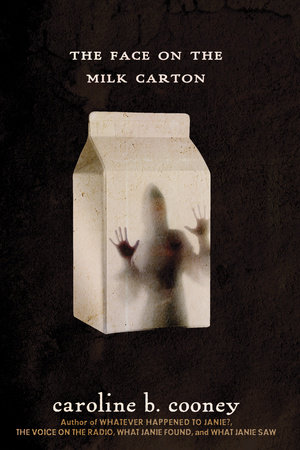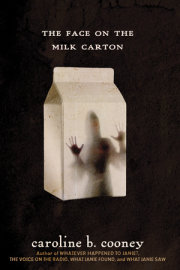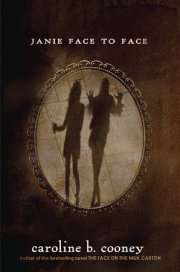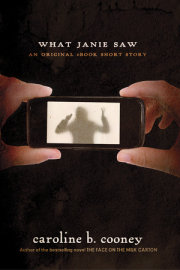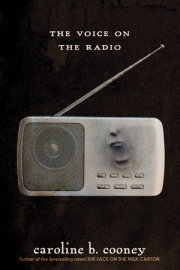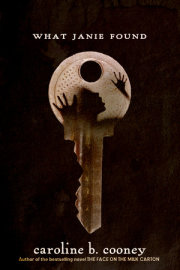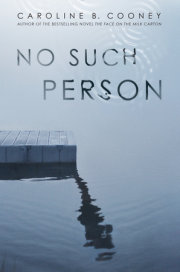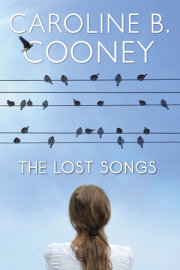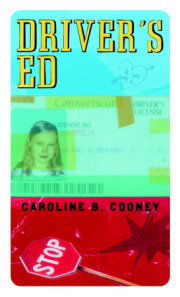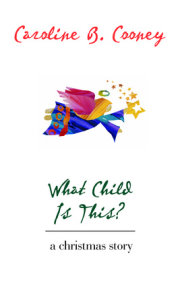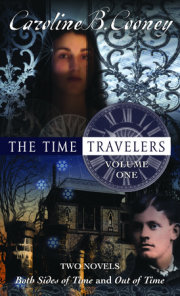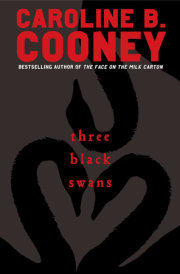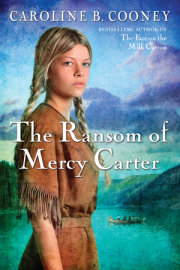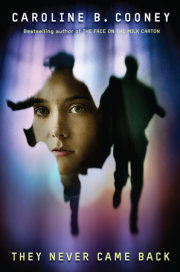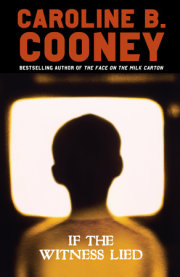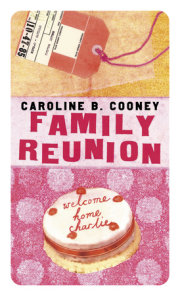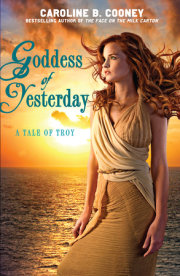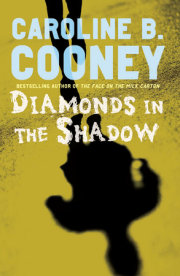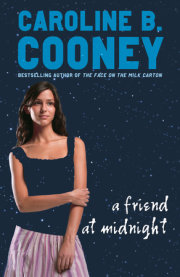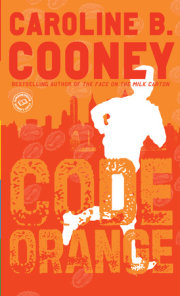Janie finished her essay.
She never knew what grade she would get in Mr. Brylowe's English class. Whenever she joked, he wanted the essay serious. Whenever she was serious, he had intended the essay to be lighthearted.
It was October.
Outdoors throbbed with autumn. She could feel the pulse of the deep-blue skies. With every leaf wrenched off its twig and whirled by the wind, Janie felt a tug. She felt like driving for hours; taking any road at all; just going.
Actually Janie was only fifteen and had barely started driving lessons. She was having driving fantasies because of dinner last night.
Her parents--as always--had taken opposite sides. Setting themselves up like a debate team, her mother and father would argue until some invisible marital timer rang. Then they would come to terms, rushing to meet in the middle. Until last night her mother had said Janie could begin driving while her father said she could not. "She's just a baby," said her father, in the infuriating, affectionate way of fathers.
"She's
old," said Janie's mother lightly. "Practically a woman. A sophomore in high school."
"I hate when that happens," her father grumbled. "I like my little girl to stay little. I'm against all this growing up.' He wound some of Janie's hair around his wrist.
Janie had fabulous hair: a wild, chaotic mane of red curls glinting gold. People always commented on it. As her best friend, Sarah-Charlotte, said, "Janie, that is
serious hair."
"I guess you've grown up anyway, Janie," said her father reluctantly. "Even with all the bricks I put on your head to keep you little. Okay, I give in. You can drive."
In English, Janie smiled to herself. Her father was an accountant who in the fall had time to coach the middle-school soccer teams. Today after school he'd have a practice, or a game, but when he came home--they'd go driving!
She wrote her name on her essay.
She had gradually changed her name. "Jane" was too dull. Last year she'd added a "y," becoming Jayne, which had more personality and was sexier. To her last name--Johnson--she'd added a "t," and later an "e" at the end, so now she was Jayne Johnstone.
Her best friends--Sarah-Charlotte Sherwood and Adair O'Dell had wonderful, tongue-twisting, memorable names. Why, with the last name Johnson (hardly a name at all; more like a page out of the phone book) had her parents chosen "Jane"? They could have named her Scarlett, or Allegra. Perhaps Roxanne.
Now she took the "h" out of Johnston and added a second "y" to Jayne.
Jayyne Jonstone. It looked like the name you would have if you designed sequined gowns for a living, or pointed to prizes on television quiz shows.
"Earth to Janie," said Mr. Brylowe.
She blushed, wondering how many times he had called her.
"The rest of us are reading our essays aloud, Janie,' said Mr. Brylowe. "We'd like to issue an invitation for you to join us."
She blushed so hotly she had to put her hands over her cheeks.
"Don't do that," said Pete. "You're cute when your face matches your hair."
Immediately, the back row of boys went into barbershop singing, hands on hearts, invisible straw hats flung into the air. "Once in love with Janie," they sang.
Janie had never had a boyfriend. She was always asked to dances, was always with a crowd--but no boy had actually said
I want to be with you and you alone.Mr. Brylowe told Janie to read her essay aloud.
The blush faded. She felt white and sick. She hated standing up in class. Hated hearing her voice all alone in the quiet of the room.
The bell rang.
English was a split period: they had lunch in the middle and came back for more class. Never had lunch come at such an appropriate moment. Perhaps she would write a better essay during the twenty-seven minutes of lunch.
Certainly it wasn't going to take Janie long to eat. They had recently discovered she had a lactose intolerance. This was a splashy way of saying she had stomachaches when she drank milk. "No more ice cream, no more milk" was the medical/parental decree.
However, peanut butter sandwiches (which she had in her bag lunch) required milk. I am so sick of fruit juice, Janie thought. I want milk.
She had been eating since the school year began with Pete, Adair, Sarah-Charlotte, Jason, and Katrina.
She loved all their names.
Her last-year's daydream--before a driver's license absorbed all daydream time--had been about her own future family. She couldn't picture her husband-to-be, but she could see her children perfectly: two beautiful little girls, and she would name them Denim and Lace. She used to think about Denim and Lace all the time. Shopping at the mall with Sarah-Charlotte, shed go into all the shoe stores to play with the little teeny sneakers for newborns, and think of all the pretty clothes she'd buy one day for Denim and Lace.
Now she knew those names were nauseating, and if she did name her daughters Denim and Lace, there'd probably be a divorce, and her husband would get custody on the grounds anybody who chose those names was unfit. She'd have to name them something sensible, like Emily and Margaret.
Peter, Adair, Sarah-Charlotte, Jason, Katrina, and Janie went in a mob down the wide stairs, through the wide halls, and into the far-too-small cafeteria. The kids complained about the architecture of the school (all that space dedicated to passing periods and hardly any to lunch), but they loved being crammed in, filching each other's potato chips, telling secrets they wanted everybody to overhear, passing notes to be snatched up by the boy you hoped would snatch them, and sending the people on the outside of the crush to get you a second milk.
Everybody but Janie Johnson got milk: cardboard cartons so small you needed at least three, but the lunch ladies would never let you. Janie was envious. Those luckies are swigging down nice thick white milk, she thought, and I'm stuck with cranberry juice.
"Okay," said Sarah-Charlotte. Sarah-Charlotte would not bother with you if you tried to abbreviate her name. Last year she had reached a standoff with a teacher who insisted on calling her Sarah. Sarah-Charlotte glared at him silently for months until he began calling her Miss Sherwood, which let them both win. "Okay, who's been kidnapped this time?" said Sarah-Charlotte wearily, as if jaded with the vast number of kidnappings in the world. Sarah-Charlotte patted her white-blond hair, which was as neat as if she had cut it out of a magazine and pasted it onto her head. Janie, whose mass of hair was never the same two minutes in a row, and whose face could be difficult to find beneath the red tangles, never figured out how Sarah-Charlotte kept her hair so neat. "I have approximately five hundred thousand fewer hairs than you do," Sarah-Charlotte explained once.
Everybody turned the milk cartons over to see who had been kidnapped. The local dairy put pictures of stolen children on the back of the carton. Every few weeks there was a new child.
"I don't know how you're supposed to recognize somebody who was three years old when she got taken from a shopping center in New Jersey, and that was nearly a dozen years ago," said Adair. "It's ridiculous." Adair was as sleek and smooth as her name; even her dark hair matched: unruffled and gleaming like a seal out of water.
Janie sipped juice from a cardboard packet and pretended it was milk. Across the cafeteria Reeve waved. Reeve lived next door. He was a senior. Reeve never did homework. It was his life ambition to get in the
Guinness Book of World Records, and the only thing he had a stab at was the "Never Did His Homework Once but Still Got the Occasional B Plus" listing.
Reeve had gotten the occasional B plus, but he had also gotten a lot of D's and F's. News came from the Academic Office that unless Reeve shaped up, he would not graduate with his class.
His two older sisters and one older brother had gone to spectacular colleges--Cornell, Princeton, and Stanford. They were mortified by Reeve's failures and came home weekends to tell him so.
Reeve had ceased to speak to his entire family. In fact, he stomped away and had supper at Janie's so often that Janie's mother had said last night, "I'm thinking of charging your parents a meal fee."
Reeve did not laugh. In a strangled voice he said, "I'm sorry. I won't come again."
Janie's father punched him, the way, if it had been Janie, he would have hugged. Jabbing Reeve in the gut, her father said, "Meals here, bed there, Reeve. Someday we'll collect our debt."
"Yeah, when I'm a plumber," said Reeve gloomily, "you'll let me clean your drains."
"Now, Reeve. Just start studying, pull those grades up, and--" Her father broke off. "Right," he said, punching Reeve again. "In this house we won't discuss it. Here. Have a brownie and some ice cream."
It was such a trespass on Reeve, that everybody knew the details. Whatever Reeve kept secret, his mother told Janie's mother anyway. Reeve felt cramped by the intimacy of his life: he had always lived in this town, always gone to this school. I want to live in a city, he'd said last night, and be anonymous.
Ruefully Janie thought her name would give her a pretty good start if she wanted to go anonymous.
Sarah-Charlotte was hoping Reeve would ask Janie out. Sarah-Charlotte was not interested in getting her driver's license; she was interested in having a steady boyfriend, who had to be tall, handsome, muscular, smart, courteous, and rich. Reeve was all but one.
"And if Reeve doesn't ask you out," was Sarah-Charlotte's theory, "maybe his friends will."
Janie did not think the boy next door ever came through in real life. Nor would any of Reeve's friends ask her out. Last year's seniors had dated lots of younger girls. This year's seniors seemed annoyed that they had to be in the same building. And Janie felt younger than her age: she had grown later, and grown less. While Adair and Sarah-Charlotte were busy becoming sophisticated and articulate, Janie remained small. Her mother said she was cute. Janie loathed that word. Cute was for toddlers and kittens. Boys didn't date cute little girls. They dated streamlined, impressive women like Sarah-Charlotte and Adair.
Besides, how would she date?
Her parents didn't even let her go to the shopping mall alone. They'd never let her date. Alone with a boy? Hah. Not likely.
Janie waved back at Reeve and he turned to his friends, duty done. If he knew I'm really Jayyne Jonstone, she thought, would he do more than wave?
She felt curiously heavy: like the difference between whole milk and skim. Through the cafeteria windows the sun gleamed, filling the school with golden shafts in which dust swirled.
On her left--so close he was nearly in her lap--Pete drank his milk in one long swig and crushed the carton in his hand. The boys loved doing that.
If they had a soda, they stamped the can under their feet and looked proudly at the flat aluminum.
"My mother says none of them are really kidnapped anyhow," said Pete. "She says it's all hype."
It took Janie several seconds to realize he was talking about the face on the milk carton. "What do you mean?" she said. She ate her peanut butter sandwich. Almost anything with peanut butter was excellent--peanut butter and marshmallow fluff; peanut butter and bananas--but a person needed milk to wash it down.
"All it is." said Pete firmly, "is divorce, where one parent gets mad and takes his own kid, but he doesn't tell the other parent where they're going. It's never actually a stranger stealing a kid, like on television."
"You mean they weren't really stolen?" said Sarah-Charlotte, vastly disappointed. She made several dramatic gestures. There was no room for dramatic gestures in the cafeteria, and people grabbed to save the whipped-cream towers on their Jell-O from getting splattered by Sarah-Charlotte's hands. "Nobody wants a ransom?" cried Sarah-Charlotte. "Nobody is being tortured?"
If I drink one carton of milk, Janie thought, is my allergy so serious I'll die? How boring the obituary would be:
Here lies Jane Johnson. I should leave a note:
Put ."Jayyne" on my stone.Janie shook her head.
Pete and Jason immediately complained that they had gotten red hair in their faces and would Janie please get a grip on her hair.
"What do you want me to do?" demanded Janie. "Wear a net around it?"
"Either that or build an addition to the cafeteria to house it," said Peter.
Everybody giggled.
Janie shook her hair more vigorously. The boys ducked and threw potato chips at Janie, while she reached for Sarah-Charlotte's milk and drank it up.
Perfect meal. Peanut butter sandwich and a glass of milk. Janie set the carton down and sighed with pleasure.
The little girl on the back of the carton stared back at her.
It wasn't much of a picture. After all, how good could a picture be when it was printed on a milk carton?
"You ready for that algebra test?" Jason asked Adair.
"I was ready till I ate cafeteria food. Do you think he'll let me out of the test if I have food poisoning?"
The girl on the carton was an ordinary little girl. Hair in tight pigtails, one against each thin cheek. A dress with a narrow white collar. The dress was white with tiny dark polka dots.
Something evil and thick settled on Janie, blocking her throat, dimming her eyes. "Sarah-Charlotte," she said. She could hear herself shouting Sarah-Charlotte's name, yet her lips were not moving; she was making no sound at all.
She reached toward Sarah-Charlotte s sleeve, but her hand didn't obey. It lay motionless on top of the carton. It looked like somebody else's hand; she could not imagine herself wearing that shade of nail polish, or that silly ring.
"You drank my milk," accused Sarah-Charlotte.
"It's me on there," Janie whispered. Her head hurt. Was the milk allergy already setting in? Or was she going insane? Could you go insane this fast? Surely it took years to lose your mind.
She imagined people losing their minds the way you might lose a penny, or your car keys--accidentally dropping your mind in the cafeteria.
"On where?" said Peter.
"The girl on the back of the carton," whispered Janie. How flat her voice sounded. As if she had ironed it. "It's me."
She remembered that dress . . . how the collar itched . . . remembered the fabric; it was summer fabric; the wind blew through it . . . remembered how those braids swung like red silk against her cheeks.
"I know you're sick of school," said Sarah-Charlotte, "but claiming to be kidnapped is going a little too far, Janie."
Pete retrieved his flattened milk and tried to shape it back into a carton. He read between the folds. "You were stolen ten years ago from a shopping center in New Jersey, Janie. What are you doing here?"
"Yeah," said Adair, giggling. "Why aren't you off yelling for the police?"
"Oh, she's just trying to get out of reading her essay," said Jason.
"No, she's just trying to steal my milk," said Sarah-Charlotte.
The bell rang. The others hurled their garbage toward the huge plastic-lined trash cans by the door, and missed. Ducking under the plump arms of the lunch ladies, they raced back to class instead of picking it up.
Janie held Sarah-Charlotte's empty milk carton and stared at the photograph of the little girl.
I was kidnapped.
Copyright © 1994 by Caroline B. Cooney. All rights reserved. No part of this excerpt may be reproduced or reprinted without permission in writing from the publisher.

